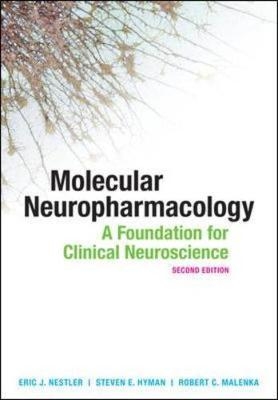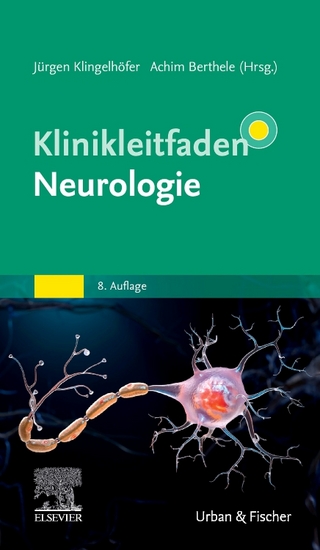
Molecular Neuropharmacology: A Foundation for Clinical Neuroscience, Second Edition
McGraw-Hill Medical (Verlag)
978-0-07-148127-4 (ISBN)
- Titel ist leider vergriffen;
keine Neuauflage - Artikel merken
Turn to the classic primer of Molecular Neuroscience for a complete understanding of nervous system function and its relationship to human neurologic disorders
A Doody's Core Title for 2011!
4 STAR DOODY'S REVIEW!
"This is an outstanding new introductory textbook on neuropharmacology and its implications for cognitive neuroscience. Anyone who wants to keep abreast of this rapidly emerging science needs to learn the fundamentals which this book would help facilitate. I highly recommend it."--Doody's Review Service
Molecular Neuropharmacology offers a clear, thorough explanation of the molecular functioning of the nervous system in normal and disease states. More than three hundred concept-clarifying full-color illustrations along with didactic text boxes provide an in-depth understanding of nerve cell receptors, their effectors and second messenger targets, and the molecular genetics that are often impacted by these systems. You will also learn how malfunction of these molecular systems relates to human disease and the corresponding medical treatment.
Molecular Neuropharmacology is the most relevant, well-written resource available to help you make the connection between neuropharmacology and clinical neuroscience.
Numerous figures and didactic boxes help you understand and remember complex subject matter for efficient, on-the-spot review. The book's all-inclusive, high-yield coverage includes:
The fundamentals of neuropharmacologyNeural substrates of drug actionThe neuropharmacology of specific functions and disorders--encompassing control of movement, mood and emotion, memory and dementia, and other vital areas NEW! A streamlined redesign that makes the book even more practical and accessible than ever NEW! More illustrations--all 300 now in full color!
Eric J. Nestler, MD is Professor and Chairman of the Department of Psychiatry and the Center for Basic Neuroscience at the Southwestern Medical School, Graduate School of Biomedical Sciences, Dallas Texas. He is also the Lou and Ellen McGinley Distinguished Chair in Psychiatric Research. The goal of Dr. Nestler's research is to better understand the ways in which the brain responds to repeated perturbations under normal and pathological conditions. A major focus of the research is drug addiction: to identify molecular changes that drugs of abuse produce in the brain to cause addiction, and to characterize the genetic and environmental factors that determine individual differences in the ability of the drugs to produce these changes. A related interest is to understand the contribution of the brain's reward regions to the regulation of normal mood as well as the abnormalities in mood and motivation seen in depression. Dr. Nestler has authored or edited 5 books, and has authored or co-authored 180 original research articles and 90 review articles and book chapters. He currently mentors seven post-doctoral fellows and six graduate students. He has trained 27 post-doctoral researchers, eight research track residents, and ten graduate students. Dr. Nestler is the recipient of numerous awards and honors, including the Pfizer Scholars Award (1987), Sloan Research Fellowship (1987), McKnight Scholar Award (1989), Efron Award of the American College of Neuropsychopharmacology (1994), and Pasarow Foundation Award for Neuropsychiatric Research (1998). He has served on the Board of Scientific Counselors of the National Institute on Drug Abuse, and currently serves on the Scientific Advisory Boards of the National Alliance for Research in Schizophrenia and Depression and of the National Alliance for Autism Research. Dr. Nestler is also a member of the National Advisory Mental Health Council, the Council of the Society for Neuroscience, and the Council of the American College of Neuropsychopharmacology Steven E. Hyman, MD is Provost of Harvard University and Professor of Neurobiology at Harvard Medical School, Boston, MA. From 1996 to 2001, he served as Director of the National Institute of Mental Health (NIMH), the component of the US National Institutes of Health charged with generating the knowledge needed to understand and treat mental illness. Before serving as Director of NIMH, Dr. Hyman was Professor of Psychiatry at Harvard Medical School, Director of Psychiatry Research at Massachusetts General Hospital , and the first faculty Director of Harvard University's Mind, Brain, and Behavior Initiative. In the laboratory he studied the molecular biology of neurotransmitter action. Dr. Hyman is a member of the Institute of Medicine of the National Academy of Sciences and of the American Academy of Arts and Sciences. He is currently serves as Editor of the Annual Review of Neuroscience. He received his BA from Yale College in 1974 summa cum laude, and his MA from the University of Cambridge in 1976, which he attended as a Mellon fellow studying the history and philosophy of science. He earned his MD from Harvard Medical School in 1980. Robert C. Malenka, MD, PhD is Pritzker Professor of Psychiatry & Behavioral Sciences at Stanford University, Palo Alto, CA. He is a fellow of the American Academy of Arts and Sciences, a member of the Institute of Medicine of the National Academies and an Associate of the Neurosciences Research Program. He has won several awards including the International Prize in Neuroscience, the Distinguished Alumni Award from Stanford University and the Daniel Efron Award from the American College of Neuropsychopharmacology. A major goal of his laboratory is to elucidate both the specific molecular events that are responsible for the triggering of these various forms of synaptic plasticity and the exact modifications in synaptic proteins that are responsible for the observed, long-lasting changes in synaptic efficacy.
Preface
Part 1: Fundamentals of Neuropharmacology
1.Basic Principles of Neuropharmacology
2.Cellular Basis of Communication
3.Synaptic Transmission
4.Signal Transduction to the Brain
Part 2: Neural Substrates of Drug Action
5.Excitatory and Inhibitory Amino Acids
6.Widely Projecting Systems: Monoamines, Acetylcholine, and Orexin
7.Neuropeptides
8.Atypical Neurotransmitters
Neuropharmacology of Neural Systems and Disorders
9.Autonomic Nervous System
10.Neural and Neuroendocrine Control of the Internal Milieu
11.Pain and Inflammation
12.Sleep and Arousal
13.Higher Cognitive Function and Behavioral Control
14.Mood and Emotion
15.Reinforcement and Addictive Disorders
16.Schizophrenia and Other Psychoses
17.Neurodegeneration
18.Seizure Disorders
19.Stroke and Migraine
Index
| Erscheint lt. Verlag | 16.12.2008 |
|---|---|
| Zusatzinfo | 350 Illustrations, unspecified |
| Verlagsort | New York |
| Sprache | englisch |
| Maße | 178 x 252 mm |
| Gewicht | 784 g |
| Themenwelt | Medizin / Pharmazie ► Medizinische Fachgebiete ► Neurologie |
| Medizin / Pharmazie ► Medizinische Fachgebiete ► Pharmakologie / Pharmakotherapie | |
| ISBN-10 | 0-07-148127-3 / 0071481273 |
| ISBN-13 | 978-0-07-148127-4 / 9780071481274 |
| Zustand | Neuware |
| Haben Sie eine Frage zum Produkt? |
aus dem Bereich


